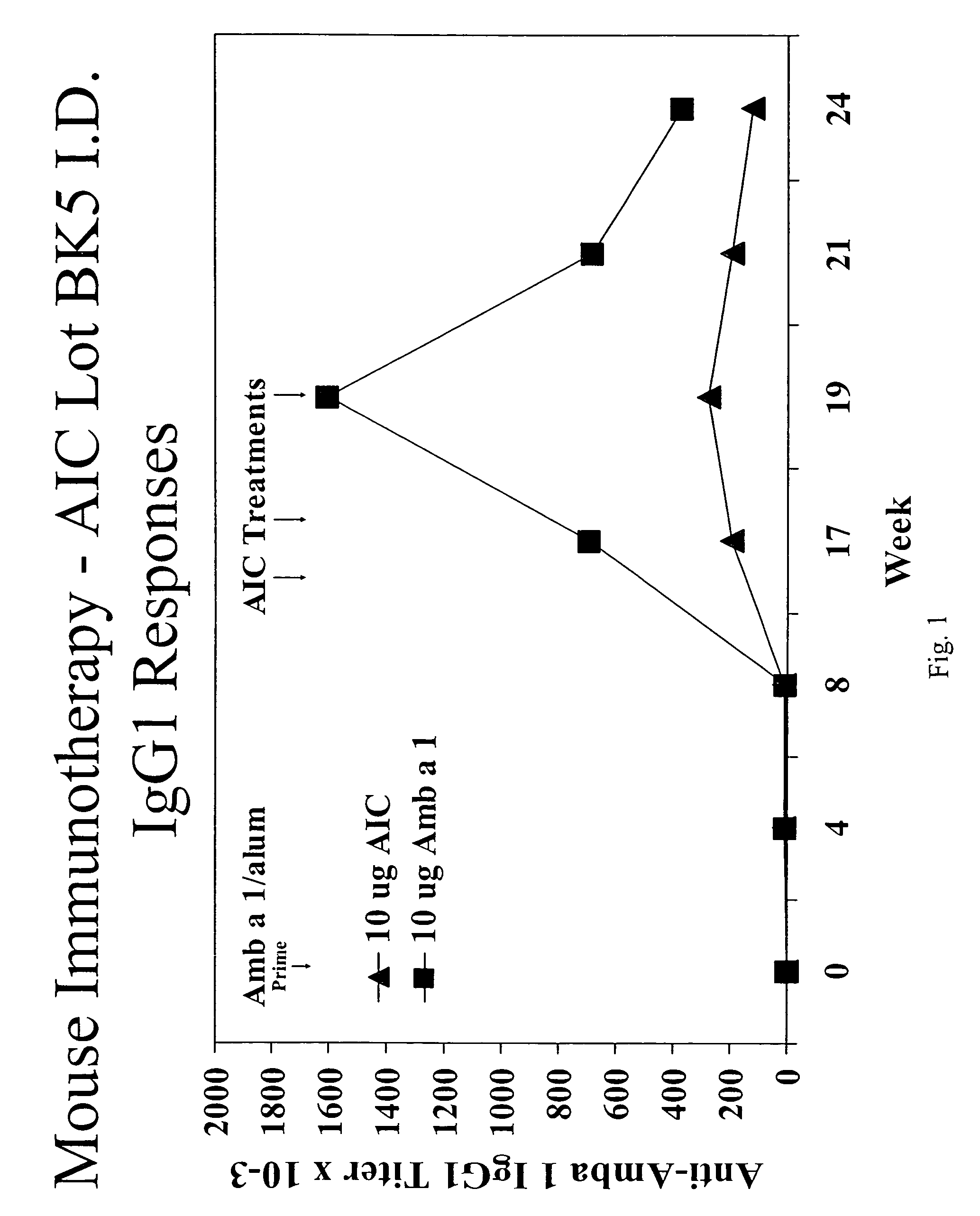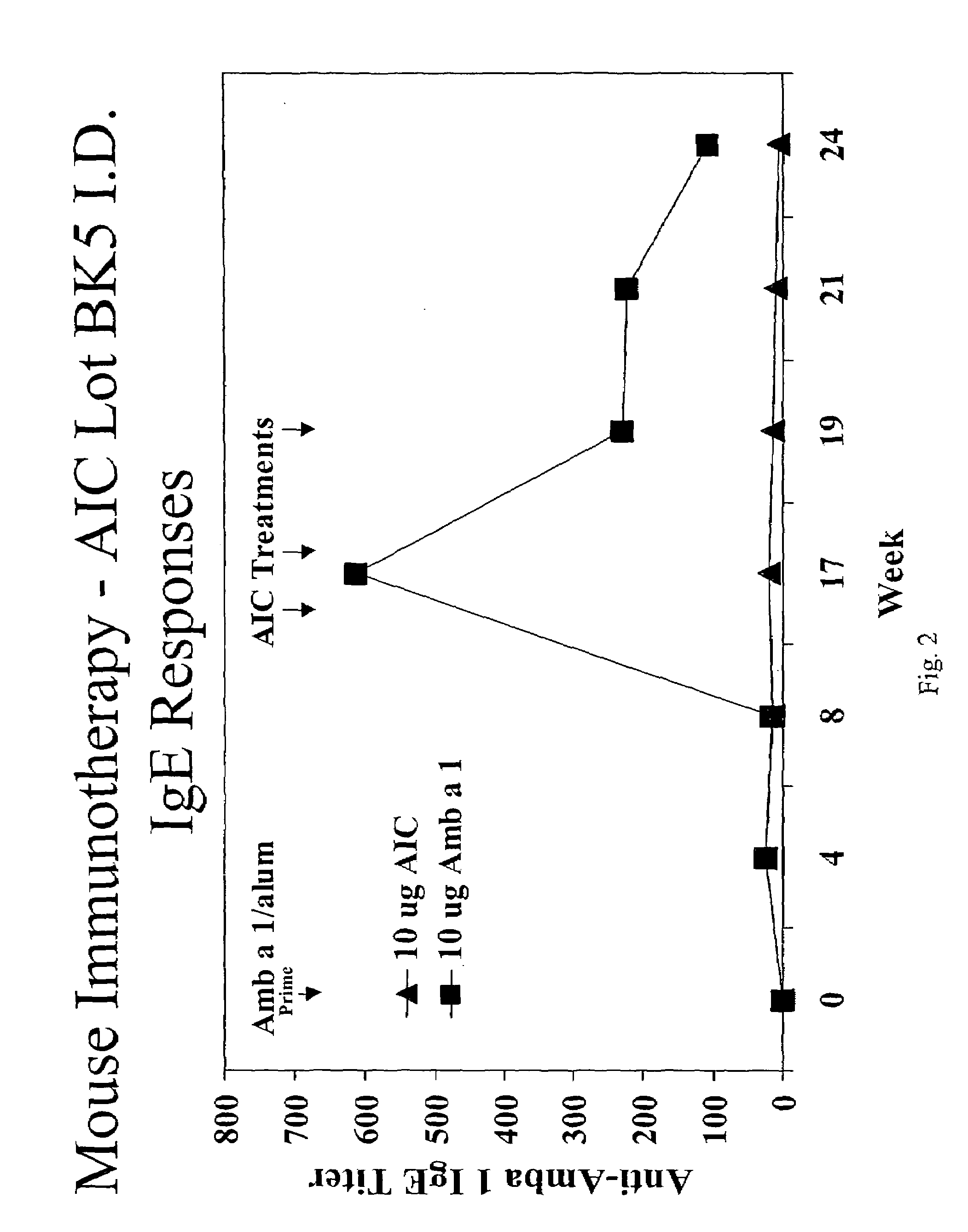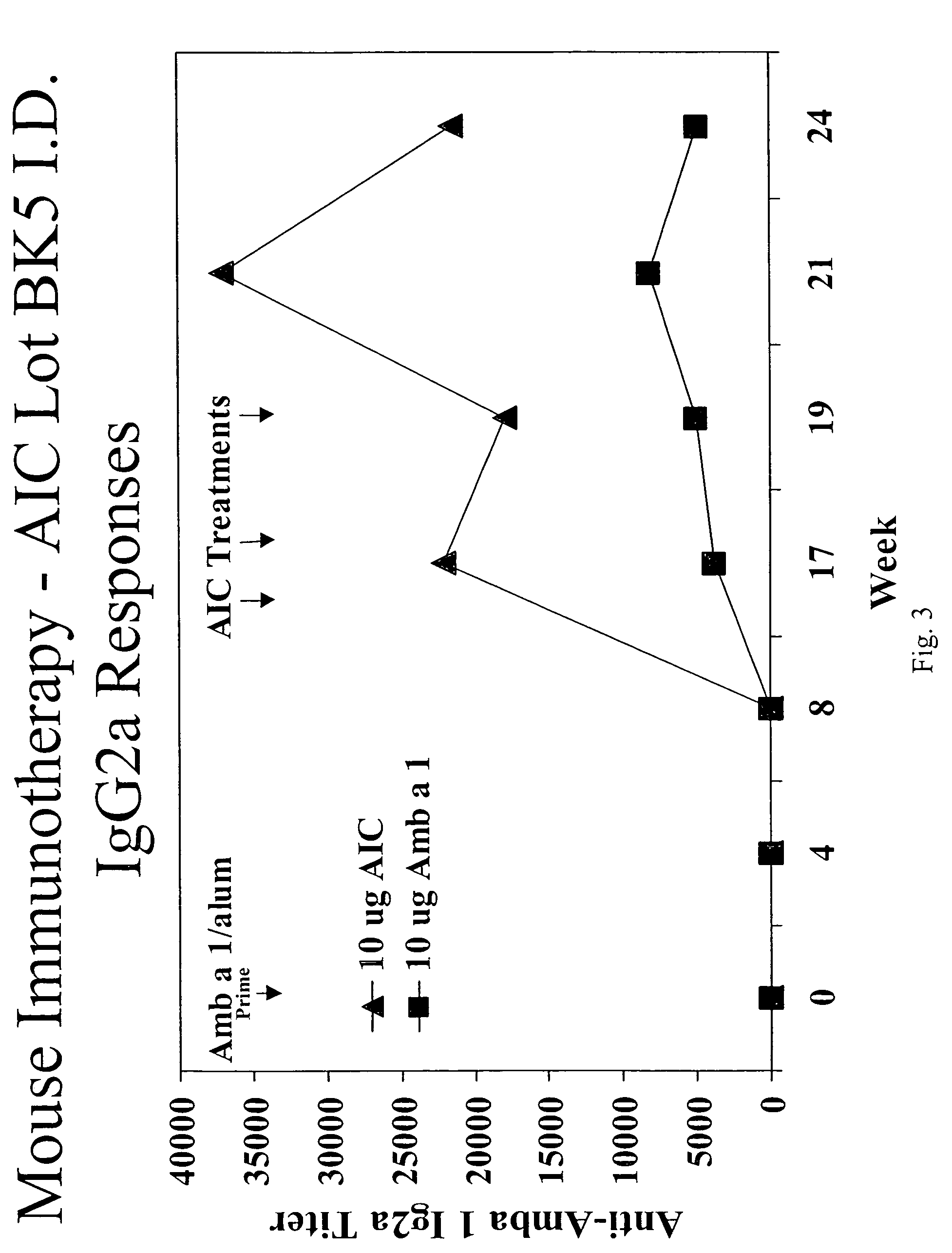Immunomodulatory compositions containing an immunostimulatory sequence linked to antigen and methods of use thereof
a technology of immunomodulatory compositions and antigens, applied in the field of immunology, can solve the problems of lack of therapeutically effective human immunodeficiency virus (hiv) vaccine, inability to elicit the immune response necessary to achieve a therapeutic effect, and inability to achieve the therapeutic effect. the effect of reducing the production of antigen-specific antibodies
- Summary
- Abstract
- Description
- Claims
- Application Information
AI Technical Summary
Benefits of technology
Problems solved by technology
Method used
Image
Examples
example 1
Preparation of AIC-L, AIC-M, or AIC-H
[0265]AIC-L, AIC-M, and AIC-H are covalent conjugates of the ragweed allergen Amb a 1 and the ISS-containing polynucleotide SEQ ID NO:1. All three classes of conjugate are prepared from the same ISS-containing polynucleotide and employing the same heterobifunctional linker. The number of oligonucleotides conjugated to the Amb a 1 can distinguish the classes. The amount of oligonucleotide bound to Amb a 1 can be determined by the measurement of size or the molecular weight of the conjugates (see FIGS. 12 and 13). AIC-L contains an average of 2–3 oligonucleotides per Amb a 1 molecule, AIC-M an average of 3.5 to 4.5, and AIC-H contains an average of >5.5. These three classes of AIC have different biological properties as described below.
Preparation and Isolation of 5′thio ISS Oligonucleotide
[0266]Triscarboxyethylphosphine (TCEP) was allowed to reach ambient temperature and dissolved in 10 mM NaPO4 / 141 mM NaCl / pH 7.2. The 5′ disulfide ISS oligonucleo...
example 2
AIC-H, AIC-M and AIC-L Immunogenicity in Mice
[0270]Groups of 10 BALB / c mice were immunized with 1 / g AIC (H, M, or L) intradermally in the tail. Control mice receive identical injections of 10 μg Amb a 1. Mice received 2 immunizations at a two-week interval. Two weeks after the first and second immunizations, mice were bled, sera prepared, and Amb a 1-specific IgG1 and IgG2a were measured by ELISA. In the mouse system, IgG1 responses are associated with Th2-type immune responses while IgG2a responses are associated with Th1-type responses.
[0271]In some experiments, mice were sacrificed four weeks after the second immunization, spleens were harvested and spleen cell cultures were prepared. These cultures were stimulated in vitro for four days with Amb a 1 and IFNγ and IL-5 secreted into the media in response to Amb a 1 was measured by ELISA. IFNγ is a product of Th1 cells while IL-5 is a product of Th2 cells.
Comparison of Immunogenicity of AIC-L, AIC-M, and Amb a 1
[0272]The antibody r...
example 3
Th1-Associated Cytokines are Induced in Mice Immunized with AIC-M and AIC-H but not with Amb a 1 Alone
[0283]Cytokine responses of spleen cells to Amb a 1 exposure in vitro are shown in Table 6 (mean titer±standard deviation). Immunization with AIC-M or AIC-H established memory spleen cells that secreted high levels of IFNγ and low levels of IL-5 in response to Amb a 1, which is indicative of a Th1 response. In contrast, immunization with unmodified Amb a 1 established memory spleen cells that secreted low levels of IFNγ and high levels of IL-5, which is indicative of a Th2 response.
[0284]Thus both AIC-M and AIC-H are able to establish a Th1 response. AIC-H produces lower antibody responses but similar cytokine responses to AIC-M.
[0285]
TABLE 6Cytokine Response to AIC-M, AIC-H, and Amb a 1IFNγ Response (pg / ml)IL-5 Response (pg / ml)ImmunizationAmb a 1MediaAmb a 1MediamaterialStimulationControlStimulationControlAIC-M40039 ±1038 ± 65 ±Lot BK12289241329 60 0AIC-H37572 ± 766 ± 38 ±Lot BK823...
PUM
| Property | Measurement | Unit |
|---|---|---|
| Mass | aaaaa | aaaaa |
| Mass | aaaaa | aaaaa |
| Fraction | aaaaa | aaaaa |
Abstract
Description
Claims
Application Information
 Login to View More
Login to View More - R&D
- Intellectual Property
- Life Sciences
- Materials
- Tech Scout
- Unparalleled Data Quality
- Higher Quality Content
- 60% Fewer Hallucinations
Browse by: Latest US Patents, China's latest patents, Technical Efficacy Thesaurus, Application Domain, Technology Topic, Popular Technical Reports.
© 2025 PatSnap. All rights reserved.Legal|Privacy policy|Modern Slavery Act Transparency Statement|Sitemap|About US| Contact US: help@patsnap.com



